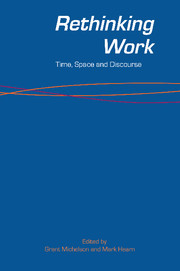Rethinking Work: A Review and Assessment
Published online by Cambridge University Press: 05 June 2012
Summary
Time, space and discourse have become important themes in the arena of work and organisation theory in recent years. Time and discourse have each developed as distinctive areas of enquiry (for example Schor 1992; Ancona et al. 2001; Grant et al. 2001; Bluedorn 2002), while space has been a central concept in debates about the globalisation of production and consumption. But what do they tell us about how work is changing? In this concluding chapter, I will review what these themes contribute, first from a policy angle in relation to some of the major changes that are occurring within European economies at this time, and second from the point of view of theoretical development in relation to understanding the contours of work and how they are changing. I argue that thematic approaches, individually and in combination, are a useful way forward, not least because much existing theory does not engage centrally with the concept of work. Using the example of the value chain as it applies in one industry, I will also suggest that we need such thematic approaches to remind ourselves of the changing relationship between value generation and work. I conclude by suggesting some of the ways that research endeavours might proceed in the future.
POLICY IMPLICATIONS FROM A EUROPEAN PERSPECTIVE
From a European perspective, the book's themes link to some of the most important debates on social policy at this time.
- Type
- Chapter
- Information
- Rethinking WorkTime, Space and Discourse, pp. 329 - 342Publisher: Cambridge University PressPrint publication year: 2006



